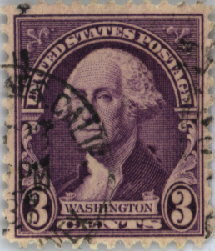Washington Plans Wisely
One name was on every man's lips for the new chief of state: George Washington, who was unanimously chosen President. On April 30, 1789, Washington took the oath of office. He pledged to execute the duties of the Presidency faithfully and, to the best of his ability, to "preserve, protect, and defend the Constitution of the United States."
It was a lusty republic that set out upon its career. The economic problems caused by the war were on their way to solution and the country was growing steadily. Immigration from Europe came in volume; good farms were to be had for small sums; labor was in strong demand. The rich valley stretches of upper New York, Pennsylvania, and Virginia soon became great wheat-growing areas.
Although many items were still homemade, manufactures too were growing. Massachusetts and Rhode Island were laying the foundation of important textile industries; Connecticut was beginning to turn out tinware and clocks; New York, New Jersey, and Pennsylvania were producing paper, glass, and iron. Shipping had grown to such an extent that on the seas the United States was second only to England. Before 1790, American ships were traveling to China to sell furs and bring back tea, spices, and silk.
The main thrust of American energy, however, was westward. New Englanders and Pennsylvanians were moving into Ohio; Virginians and Carolinians were heading for Kentucky and Tennessee. Up the long slopes of the Alleghenies climbed the white-topped wagons of the frontiersmen's trains. Into Kentucky wound the buckskin-clad hunters and the pioneers with carts of furniture, seeds, farm implements, and domestic. animals. In many a rough clearing, the frontier farmer and his neighbors raised a log cabin, its timbers chinked with clay, its roof covered with oak staves. Year after year, rafts and boats laden with grain, salt meat, and potash floated down the Mississippi to New Orleans. Western towns grew more important.
This was the state of affairs when Washington took office.
The new Constitution enjoyed neither tradition nor the full
backing of organized public opinion. The two parties formed during
 the period
of ratification continued to be antagonistic. The
Federalists were for strong central government and the fostering of
business and commercial interests. The Anti-Federalists were the
champions of states' rights and agrarianism.
the period
of ratification continued to be antagonistic. The
Federalists were for strong central government and the fostering of
business and commercial interests. The Anti-Federalists were the
champions of states' rights and agrarianism.
Moreover, the new government had to create its own machinery. No taxes were coming in. Until a judiciary could be established, there was no means of law enforcement. The army was small. The navy had ceased to exist. At this critical juncture Washington's wise leadership was crucial. The qualities that had made him the first soldier in the Revolution also fitted him to be the first statesman in the newly organized republic. He had the foresight to plan wisely for distant ends and the capacity for taking infinite pains. Direct rather than shrewd, daring and brave though dignified, reserved, and sincerely humble, he inspired respect and trust.
